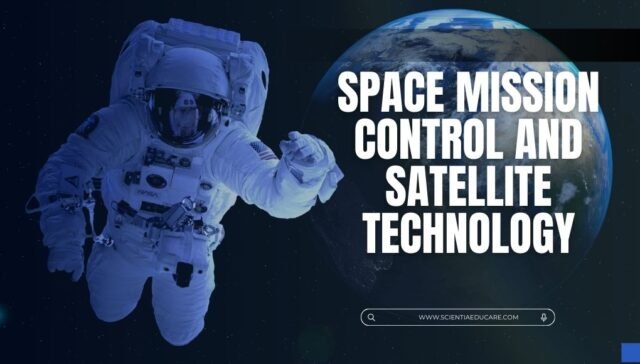The realm of space exploration has always captivated human imagination, leading to significant advancements in technology and a plethora of career opportunities. Among the most critical roles in this sector are those in space mission control and satellite technology. These fields offer dynamic and rewarding careers for individuals passionate about space science and engineering.
Entry-level satellite technology jobs,
Space mission control career opportunities,
Satellite operations engineer positions,
Jobs in satellite data analysis,
Space mission control job openings.
Table of Contents
- Introduction to Space Mission Control and Satellite Technology
- Key Roles in Space Mission Control
- Careers in Satellite Technology
- Global Job Prospects and Resources
- Top Educational Institutions Offering Relevant Courses
- Further Reading and Resources
1. Introduction to Space Mission Control and Satellite Technology
Space mission control refers to the operations center responsible for managing and monitoring space missions, ensuring spacecraft operate as intended. Satellite technology encompasses the design, development, and maintenance of satellites used for communication, navigation, and observation. Professionals in these fields collaborate to ensure the success and safety of space missions.
2. Key Roles in Space Mission Control
Space mission control is a hub of activity, requiring a diverse team of experts to manage various aspects of a mission. Key roles include:
- Flight Director: Oversees the entire mission, making critical decisions and ensuring all operations run smoothly.
- Flight Controllers: Specialists responsible for specific systems such as propulsion, navigation, or life support.
- Communication Specialists: Manage communication between the spacecraft and mission control, ensuring clear and accurate information exchange.
- Mission Planners: Develop detailed plans and procedures for mission execution, including trajectory analysis and contingency planning.
These professionals work in unison to monitor spacecraft systems, respond to anomalies, and ensure mission objectives are achieved.
3. Careers in Satellite Technology
The satellite industry offers a wide array of career opportunities, including:
- Satellite Engineers: Design and develop satellite systems, focusing on aspects like structural integrity, thermal control, and power systems.
- Payload Specialists: Focus on the instruments and experiments carried by satellites, ensuring they function correctly and collect necessary data.
- Ground Station Technicians: Manage the equipment that communicates with satellites, including antennas and receivers.
- Satellite Operations Analysts: Monitor satellite performance, analyze data, and implement adjustments to optimize functionality.
These roles are crucial for the successful deployment, operation, and maintenance of satellites that support various applications such as telecommunications, weather forecasting, and global positioning systems.
4. Global Job Prospects and Resources
The demand for professionals in space mission control and satellite technology is on the rise globally. Various organizations and companies are actively seeking skilled individuals to join their teams. Here are some resources to explore current job opportunities:
- NASA Careers: Offers a range of positions in mission control and satellite operations.
- Space-Careers.com: A comprehensive job portal listing opportunities in the space industry worldwide.
- Space Force Careers: Provides information on careers in space operations, engineering, and intelligence within the U.S. Space Force.
- Indeed: Lists numerous spacecraft mission control positions across various organizations.
Additionally, companies like Lynk Global are seeking Satellite Flight Operations Engineers to manage satellite command and control responsibilities.
5. Top Educational Institutions Offering Relevant Courses
Pursuing a career in space mission control and satellite technology typically requires a strong educational background in aerospace engineering, astrophysics, or related fields. Here are some top universities offering relevant programs:
- University of Maryland, USA: Offers comprehensive programs in aerospace engineering with opportunities to specialize in satellite technology.
- University of Colorado Boulder, USA: Known for its robust aerospace engineering programs and research initiatives in space systems.
- University of California, Los Angeles (UCLA), USA: Provides courses in spacecraft design and satellite communications.
- Stanford University, USA: Offers advanced studies in astronautics and space mission design.
- University of Southern California, USA: Features programs focusing on space technology and satellite engineering.
- University of Toronto Institute for Aerospace Studies (UTIAS), Canada: Offers graduate programs in space systems engineering with a strong emphasis on satellite design.
These institutions provide rigorous curricula and research opportunities to prepare students for successful careers in the space industry.
6. Further Reading and Resources
For those interested in delving deeper into careers in space mission control and satellite technology, the following resources offer valuable insights:
- “Space careers: A universe of options”: An article by the Bureau of Labor Statistics exploring various occupations in space missions.
- “Career Opportunities in Space Exploration: From Astronauts to Mission Specialists”: Discusses the diverse career paths available in space exploration.
- “Top Jobs With a Space Studies Degree You Can Pursue”: Highlights various career options for individuals with a space studies background.














